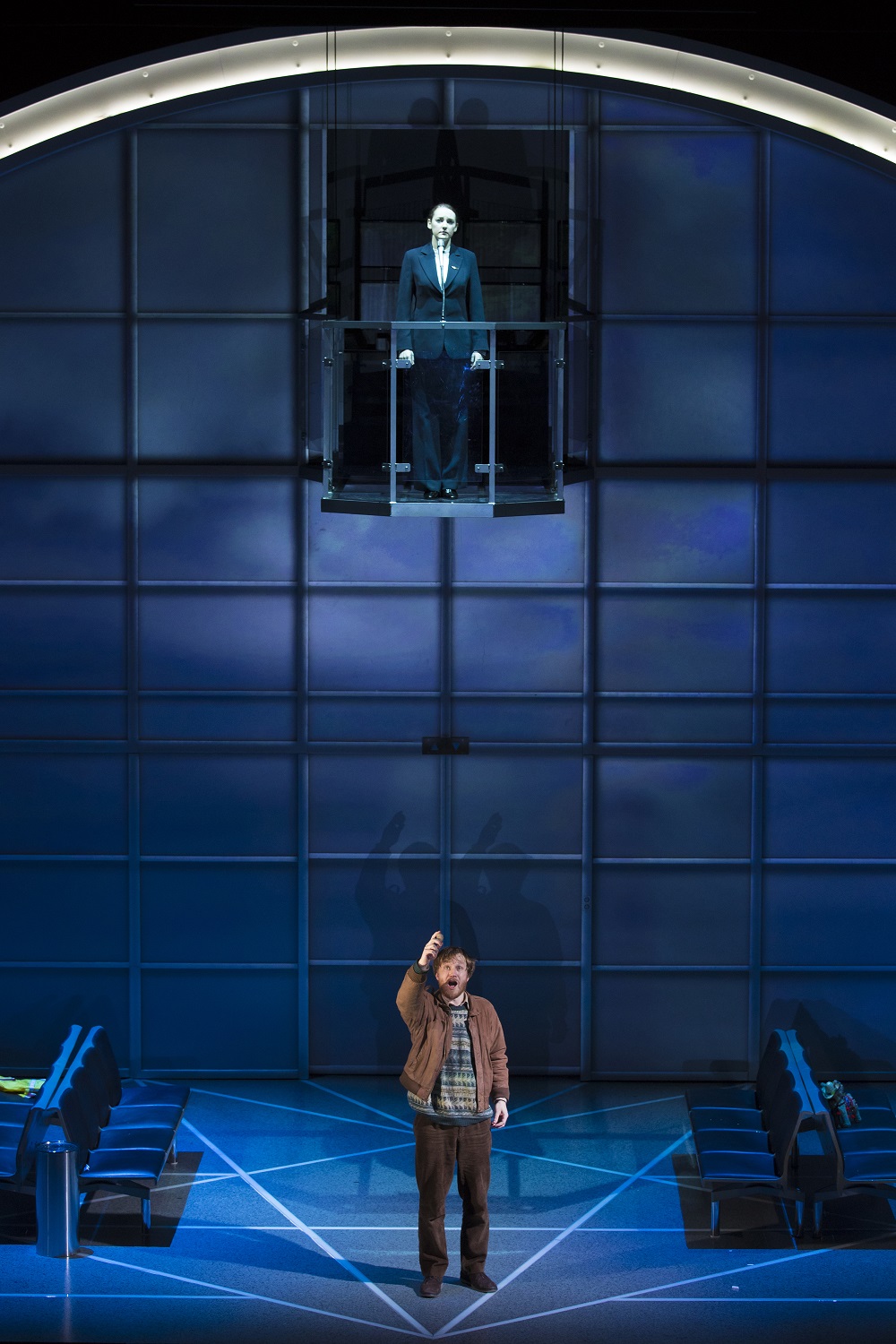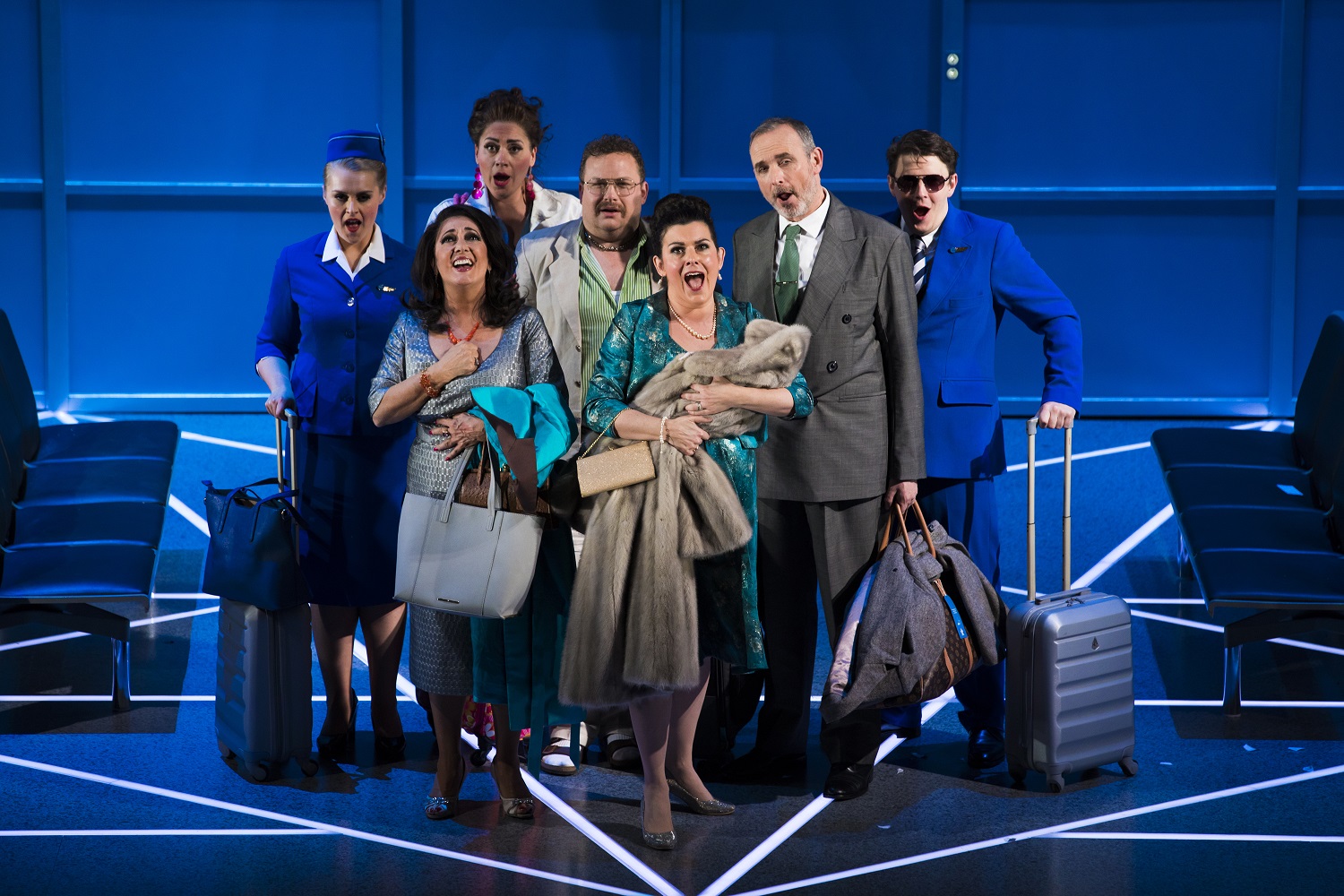Flight, Scottish Opera review - poignant and powerful, this production soars | reviews, news & interviews
Flight, Scottish Opera review - poignant and powerful, this production soars
Flight, Scottish Opera review - poignant and powerful, this production soars
Opera Holland Park's 2015 staging flies north of the border
Inspired by the astonishing true story of Mehran Karimi Nasseri, the Iranian refugee who lived in Charles de Gaulle Airport for 18 years, Jonathan Dove’s Flight is a humorous, touching, uplifting yet profoundly poignant study into human relationships, interactions and emotions. This is opera buffa for the modern age – relevant, relatable, lighthearted and often downright silly, but still revealing some very pertinent truths.
The beginning of Act 1 sees the airport in the very early hours of the morning, capturing the dreamy, ethereal stillness of a world on the brink of awakening. Soprano Jennifer France, as the God-like controller, alone in her tower, sings with a stunning clarity, giving the role a balanced fusion of dominance with serenity, as James Laing’s Refugee stares up at her in awe (the two pictured below). As the airport springs into life, the Scottish Opera Orchestra is on tremendous form, colouring Dove’s vivid, witty score. The chimes of an airport announcement are emulated from tuned percussion and scurrying strings create an air of busyness, of the bustling energy of people in transit.

The set returns to darkness for the beginning of Act 2, and in the bleak, gloomy airport, there’s room for emotions to distill and intensify, as cabin fever forces a spotlight on each character’s thoughts and desires. Even the controller shows she is human too as she steps down from her lofty tower, wandering the stage, downcast, cigarette in hand. Mezzo-soprano Victoria Simmonds, making her Scottish Opera debut as the Minskwoman, gives an achingly beautiful performance in the aria "I bought this suitcase in New York", as the character ponders her fears over the changes about to befall her; moving to a new country, motherhood, departing the life she knows.
As the storm rages, Richard Howell’s clever lighting design heightens the panic and confusion, and the rambunctious lower brass rumblings from the pit convey the frenzy of the outside elements. The characters on stage too descend into chaos. The women raid the drinks trolley, and there’s definitely a layered meaning to Bill and the air steward’s cries of "I’m so high" when they take a trip up to the control tower. It’s during the storm, this strange period of fear and uncertainty, that the passengers begin to warm to the refugee, before viciously turning on him, showing the true colours of society’s fickle attitudes towards those desolate and in need.

This is a marvellous production, and the synergy between cast members is uniformly sound. Ensemble pieces are delivered with gorgeous vocal blending (seven of the cast pictured above), and Dove’s comic timing is expertly precise. From the pit, the orchestra, under the baton of Stuart Stratford, is resplendent throughout, illuminating the many layers of Dove’s music with dazzling shine.
rating
Explore topics
Share this article
The future of Arts Journalism
You can stop theartsdesk.com closing!
We urgently need financing to survive. Our fundraising drive has thus far raised £49,000 but we need to reach £100,000 or we will be forced to close. Please contribute here: https://gofund.me/c3f6033d
And if you can forward this information to anyone who might assist, we’d be grateful.

Subscribe to theartsdesk.com
Thank you for continuing to read our work on theartsdesk.com. For unlimited access to every article in its entirety, including our archive of more than 15,000 pieces, we're asking for £5 per month or £40 per year. We feel it's a very good deal, and hope you do too.
To take a subscription now simply click here.
And if you're looking for that extra gift for a friend or family member, why not treat them to a theartsdesk.com gift subscription?
more Opera
 La bohème, Opera North review - still young at 32
Love and separation, ecstasy and heartbreak, in masterfully updated Puccini
La bohème, Opera North review - still young at 32
Love and separation, ecstasy and heartbreak, in masterfully updated Puccini
 Albert Herring, English National Opera review - a great comedy with depths fully realised
Britten’s delight was never made for the Coliseum, but it works on its first outing there
Albert Herring, English National Opera review - a great comedy with depths fully realised
Britten’s delight was never made for the Coliseum, but it works on its first outing there
 Carmen, English National Opera review - not quite dangerous
Hopes for Niamh O’Sullivan only partly fulfilled, though much good singing throughout
Carmen, English National Opera review - not quite dangerous
Hopes for Niamh O’Sullivan only partly fulfilled, though much good singing throughout
 Giustino, Linbury Theatre review - a stylish account of a slight opera
Gods, mortals and monsters do battle in Handel's charming drama
Giustino, Linbury Theatre review - a stylish account of a slight opera
Gods, mortals and monsters do battle in Handel's charming drama
 Susanna, Opera North review - hybrid staging of a Handel oratorio
Dance and signing complement outstanding singing in a story of virtue rewarded
Susanna, Opera North review - hybrid staging of a Handel oratorio
Dance and signing complement outstanding singing in a story of virtue rewarded
 Ariodante, Opéra Garnier, Paris review - a blast of Baroque beauty
A near-perfect night at the opera
Ariodante, Opéra Garnier, Paris review - a blast of Baroque beauty
A near-perfect night at the opera
 Cinderella/La Cenerentola, English National Opera review - the truth behind the tinsel
Appealing performances cut through hyperactive stagecraft
Cinderella/La Cenerentola, English National Opera review - the truth behind the tinsel
Appealing performances cut through hyperactive stagecraft
 Tosca, Royal Opera review - Ailyn Pérez steps in as the most vivid of divas
Jakub Hrůša’s multicoloured Puccini last night found a soprano to match
Tosca, Royal Opera review - Ailyn Pérez steps in as the most vivid of divas
Jakub Hrůša’s multicoloured Puccini last night found a soprano to match
 Tosca, Welsh National Opera review - a great company reduced to brilliance
The old warhorse made special by the basics
Tosca, Welsh National Opera review - a great company reduced to brilliance
The old warhorse made special by the basics
 BBC Proms: The Marriage of Figaro, Glyndebourne Festival review - merriment and menace
Strong Proms transfer for a robust and affecting show
BBC Proms: The Marriage of Figaro, Glyndebourne Festival review - merriment and menace
Strong Proms transfer for a robust and affecting show
 BBC Proms: Suor Angelica, LSO, Pappano review - earthly passion, heavenly grief
A Sister to remember blesses Puccini's convent tragedy
BBC Proms: Suor Angelica, LSO, Pappano review - earthly passion, heavenly grief
A Sister to remember blesses Puccini's convent tragedy
 Orpheus and Eurydice, Opera Queensland/SCO, Edinburgh International Festival 2025 review - dazzling, but distracting
Eye-popping acrobatics don’t always assist in Gluck’s quest for operatic truth
Orpheus and Eurydice, Opera Queensland/SCO, Edinburgh International Festival 2025 review - dazzling, but distracting
Eye-popping acrobatics don’t always assist in Gluck’s quest for operatic truth

Add comment